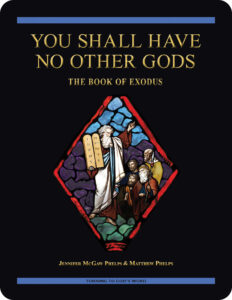 You Shall Have No Other Gods:
You Shall Have No Other Gods:
The Book of Exodus
Lesson 28 The Glory of the LORD
the book of Exodus 39:1—40:38
Revised Standard Version Catholic Edition (RSVCE)*
New American Bible Revised Edition (NABRE)*
Catechism of the Catholic Church
Rosarium Virginis Mariae (Rosary of the Virgin Mary)
ex libris (in our library)
glossary for the book of Exodus
cross references in the book of Exodus
This material coordinates with Lesson 28 on pages 139–145 in the study book You Shall Have No Other Gods: The Book of Exodus.
And God spoke all these words, saying, ‘I am the LORD your God, who brought you out of the land of Egypt, out of the house of bondage. You shall have no other gods before me. You shall not make for yourself a graven image, or any likeness of anything that is in heaven above, or that is in the earth beneath, or that is in the water under the earth; you shall not bow down to them or serve them; for I the LORD your God am a jealous God, visiting the iniquity of the fathers upon the children to the third and the fourth generation of those who hate me, but showing mercy to thousands of those who love me and keep my commandments.”—the book of Exodus 20:1–6
welcome to our in-depth study of the book of Exodus
We invite interested groups and individuals to check out the sample first lesson and video from this 28-lesson Turning to  God’s Word Catholic Bible study. These online study pages provide links to free r
God’s Word Catholic Bible study. These online study pages provide links to free r elated lesson videos, a glossary and cross references in the biblical text, and they include maps, additional commentary, and prayers based on the primary Scripture in each lesson. You Shall Have No Other Gods: The Book of Exodus has been granted an imprimatur and is available for purchase from our website shop. If you have a Bible-related question or comment, click on one of the “ask us your question” or “what do you think” buttons on any online study page.
elated lesson videos, a glossary and cross references in the biblical text, and they include maps, additional commentary, and prayers based on the primary Scripture in each lesson. You Shall Have No Other Gods: The Book of Exodus has been granted an imprimatur and is available for purchase from our website shop. If you have a Bible-related question or comment, click on one of the “ask us your question” or “what do you think” buttons on any online study page.
open with prayer
It’s always wise to begin any Bible study with prayer, whether reading the Scriptures alone or meeting with others in a discussion group. You can pray using your own words or use one of the opening prayers on our website. We especially like the following:
Lord Jesus, you promised to send your Holy Spirit to teach us all things.
As we read and study your word today,
allow it to touch our hearts and change our lives. Amen.
let’s review—the book of Exodus 37:10—38:31
Lesson 27 The Tabernacle Is Completed looks at the final goal of the Israelites in the book of Exodus—finishing the tabernacle so that the LORD will be able to travel with the people as they journey through the wilderness toward the Promised Land of Canaan. The tabernacle is crucial to that occurring. If the people want God to be their traveling companion, they need to provide for him—and God doesn’t travel light. Preparing a place for the LORD in their everyday lives requires that the people sacrifice more than animals. They’re required also to give valuable metals, gems, and dyed linen cloth, as well as their time and talents to create a movable sanctuary for God. We Christians can relate to this section of the book of Exodus by considering what we can do to make our lives more attractive for the LORD in order that God might spend time dwelling with us, something that’s possible only after the sacrifice of Jesus.
map notes—various routes to the Promised Land
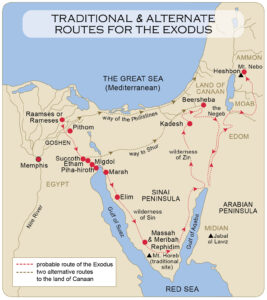 Although Scripture suggests that the Israelites take a rather circuitous route to the land of Canaan, the book of Exodus ends with them preparing to embark on their journey from the mountain where they’ve been encamped while building the tabernacle. There were two more direct routes from Egypt to the land of Canaan, though few scholars believe that either was used by the Israelites on their 40-year trek across the Sinai Peninsula to the area around the Dead Sea (also sometimes called the Salt Seat). Click on the map (right) to enlarge it and get a better look at those alternate routes as well as the traditional route it’s thought that the Israelites actually traveled. The original map is on page 143 in You Shall Have No Other Gods: The Book of Exodus.
Although Scripture suggests that the Israelites take a rather circuitous route to the land of Canaan, the book of Exodus ends with them preparing to embark on their journey from the mountain where they’ve been encamped while building the tabernacle. There were two more direct routes from Egypt to the land of Canaan, though few scholars believe that either was used by the Israelites on their 40-year trek across the Sinai Peninsula to the area around the Dead Sea (also sometimes called the Salt Seat). Click on the map (right) to enlarge it and get a better look at those alternate routes as well as the traditional route it’s thought that the Israelites actually traveled. The original map is on page 143 in You Shall Have No Other Gods: The Book of Exodus.
more map notes—where the Israelites finally settle
Most people have a general idea of where the descendants of Jacob settle in the Promised Land; few 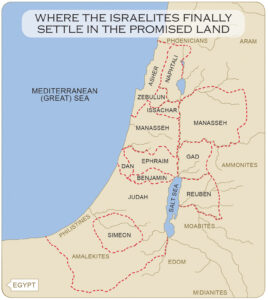 have much sense of which part of that larger territory is allotted to each of the 12 tribes—minus the tribe of Levi and including the half-tribes headed by Joseph’s Egyptian-born sons, Ephraim and Manasseh. The map shows where each tribe eventually settles. The tribe of Dan moves north to settle in the vicinity of the Lake of Tiberias. Scholars believe that some members of the tribe of Simeon also may have moved north to settle in part of the northern kingdom of Israel. It’s also thought that some of the tribe of Simeon may have been absorbed by the tribe of Judah. Click on the map (right) to enlarge it. The original map is on page 145 in
have much sense of which part of that larger territory is allotted to each of the 12 tribes—minus the tribe of Levi and including the half-tribes headed by Joseph’s Egyptian-born sons, Ephraim and Manasseh. The map shows where each tribe eventually settles. The tribe of Dan moves north to settle in the vicinity of the Lake of Tiberias. Scholars believe that some members of the tribe of Simeon also may have moved north to settle in part of the northern kingdom of Israel. It’s also thought that some of the tribe of Simeon may have been absorbed by the tribe of Judah. Click on the map (right) to enlarge it. The original map is on page 145 in  You Shall Have No Other Gods: The Book of Exodus. The same map also is on page 157 in Lesson 28 Jacob’s Final Words to His Sons in the Turning to God’s Word Catholic Bible study In the Beginning: The Book of Genesis.
You Shall Have No Other Gods: The Book of Exodus. The same map also is on page 157 in Lesson 28 Jacob’s Final Words to His Sons in the Turning to God’s Word Catholic Bible study In the Beginning: The Book of Genesis.
 our study of the book of Exodus is finished (26:02)
our study of the book of Exodus is finished (26:02)
The last lesson in You Shall Have No Other Gods: The Book of Exodus offers an  opportunity for review. Turning to God’s Word author Matthew Phelps addresses some of the main ideas in the biblical text and clarifies themes that are easy to miss when the Scripture passages are read individually and out of context. For instance, it’s easy to miss the overall importance of the Old Covenant that the LORD enters into with his people. Prior to this, relationship with God seemed to be limited to individual men and women, beginning (after Noah and the Flood) with the patriarch Abraham and his
opportunity for review. Turning to God’s Word author Matthew Phelps addresses some of the main ideas in the biblical text and clarifies themes that are easy to miss when the Scripture passages are read individually and out of context. For instance, it’s easy to miss the overall importance of the Old Covenant that the LORD enters into with his people. Prior to this, relationship with God seemed to be limited to individual men and women, beginning (after Noah and the Flood) with the patriarch Abraham and his  wife Sarah. In the book of Exodus, the LORD chooses to interact more directly with all of the descendants of Jacob, who is himself the grandson of Abraham.
wife Sarah. In the book of Exodus, the LORD chooses to interact more directly with all of the descendants of Jacob, who is himself the grandson of Abraham.
The Scripture ranges for the videos that accompany this Catholic Bible study from Turning to God’s Word match the Scripture ranges for the sets of questions in You Shall Have No Other Gods: The Book of Exodus. You can follow along as Turning to God’s Word author Matthew Phelps discusses Lesson 28, “The Glory of the LORD,” on pages 139–145 in the study book.
Aaron & not Moses is chosen to be high priest
Many people have the idea that being high priest is the ultimate way to serve the LORD. A careful reading of the book of Exodus, however, fails to support that opinion. Neither, for that matter, does the twelfth chapter in the book of Numbers back up that idea. That passage describes Aaron and Miriam feeling jealousy about the relationship Moses has with God. In that passage, the LORD clearly spells out important characteristics of his relationship with Moses.
the book of Exodus is about how to establish & maintain relationship with the LORD
Throughout the book of Exodus, the focus has been on the development of Moses’ relationship with God. The main job of priests is to help facilitate relationship between the LORD and his people. This can involve offering sacrifice to atone for sin, but that sacrifice and atonement is only a means to an end. The end is a more intimate relationship between God and his people. Toward that end, the priests are expected to mediate with the LORD on behalf of the people. In order to serve as a successful mediator, it’s essential that a priest himself have a close relationship with God.
glory—you could look it up in our archives
 The book of Exodus 40:34 describes God’s glory filling the newly constructed tabernacle. To learn more about the meaning of the word glory, read Lost in Translation, an online column in which Turning to God’s Word author Matthew Phelps helps readers connect with ideas expressed in the original languages of the Scriptures. Consider why glory might be a fitting way to describe the way in which the LORD settles on the tabernacle. New Lost in Translation entries are posted on Mondays, and past entries are archived on our website. Contact us if you’d like to receive Lost in Translation by email every week.
The book of Exodus 40:34 describes God’s glory filling the newly constructed tabernacle. To learn more about the meaning of the word glory, read Lost in Translation, an online column in which Turning to God’s Word author Matthew Phelps helps readers connect with ideas expressed in the original languages of the Scriptures. Consider why glory might be a fitting way to describe the way in which the LORD settles on the tabernacle. New Lost in Translation entries are posted on Mondays, and past entries are archived on our website. Contact us if you’d like to receive Lost in Translation by email every week.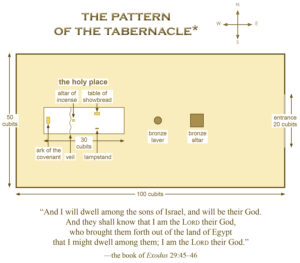
the rest of the story
The final book of the Pentateuch (the first five books in the Old Testament—the books of Genesis, Exodus, Leviticus, Numbers, and Deuteronomy) is the book of Deuteronomy, which repeats much of the narrative material in the other four books, especially in the book of Exodus. The final chapters of the book of Deuteronomy also include an account of Moses’ death. Even the ending of the book of Deuteronomy, however, fails to place the people in the Promised Land, although Joshua is identified as the Israelite who’s going to take the place of Moses. Participants who want to learn more about how the Israelites finally enter the Promised Land of Canaan may like reading the Book of Joshua.
the book of Deuteronomy suggests what matters about the book of Exodus
It’s easy to overlook that the book of Exodus is about a lot more than God leading the Israelites through the Red Sea to escape from the Egyptians, and even about more than the giving of the Ten Commandments. What matters is the Old Covenant that the LORD enters into, making the Israelites his own people and becoming their God. The book of Deuteronomy 26:16–19 sums up exactly what that means: “This day the LORD your God commands you to do these statutes and ordinances; you shall therefore be careful to do them with all your heart and with all your soul. You have declared this day concerning the LORD that he is your God, and that you will walk in his ways, and keep his statutes and his commandments and his ordinances, and will obey his voice; and the LORD has declared this day concerning you that you are a people for his own possession, as he has promised you, and that you are to keep all his commandments, that he will set you high above all nations that he has made, in praise and in fame and in honor, and that you shall be a people holy to the LORD your God, as he has spoken.”
WHAT DO YOU THINK is important about the book of Exodus?
The primary goal of any Bible study is to learn about God with the aim of entering into more intimate spiritual relationship.
 ? What do you feel is the most important thing that you’ve learned about God during this study of You Shall Have No Other Gods: The Book of Exodus?
? What do you feel is the most important thing that you’ve learned about God during this study of You Shall Have No Other Gods: The Book of Exodus?
? How has your understanding of the early Hebrew roots of your Christian faith changed as a result of participating in this Catholic Bible study?
? What’s one unexpected way that this study of the book of Exodus has touched your life?
? Consider whether learning more about the book of Exodus has had any effect on your present-day worship experience. List specific examples to support your response.
? What’s something that you’ve learned from this Catholic Bible study that you’d like to share with others?
the best Catholic commentary about Scripture
 To find out more about how Church teaching is supported by Scripture passages in You Shall Have No Other Gods: The Book of Exodus, check out the Index of Citations in the Catechism of the Catholic Church. Links to the primary Scripture passages in the lesson (Revised Standard Version Catholic Edition [RSVCE*]) and relevant paragraphs in the Catechism are provided here. Not every passage in the biblical text for this Catholic study is referenced in a Catechism paragraph, however.
To find out more about how Church teaching is supported by Scripture passages in You Shall Have No Other Gods: The Book of Exodus, check out the Index of Citations in the Catechism of the Catholic Church. Links to the primary Scripture passages in the lesson (Revised Standard Version Catholic Edition [RSVCE*]) and relevant paragraphs in the Catechism are provided here. Not every passage in the biblical text for this Catholic study is referenced in a Catechism paragraph, however.
the book of Exodus 40:1–2—paragraph 2058
the book of Exodus 40:36–38—paragraph 697
ways our glossary might prove helpful
In addition to providing extra information about geographical locations, our glossary also points out  when a person or place is mentioned in the biblical text under more than one name or more than one spelling. If you can remember a name but aren’t sure in which lesson it shows up, you can find it in the glossary, which lists every proper noun that appears in the biblical text for every lesson in You Shall Have No Other Gods: The Book of Exodus.
when a person or place is mentioned in the biblical text under more than one name or more than one spelling. If you can remember a name but aren’t sure in which lesson it shows up, you can find it in the glossary, which lists every proper noun that appears in the biblical text for every lesson in You Shall Have No Other Gods: The Book of Exodus.
to learn more, read more Scripture
If you’re having difficulty with a particular passage of Scripture, it can be helpful to read the relevant  cross references—but looking these up can take time. To make that easier, we’ve compiled the cross references from the Revised Standard Version Second Catholic Edition (RSV2CE)—the translation that we reprint in our study books. That list can be found at the top of every online study page accompanying this study, and it includes links to each of the cross references in the primary biblical text for You Shall Have No Other Gods: The Book of Exodus.
cross references—but looking these up can take time. To make that easier, we’ve compiled the cross references from the Revised Standard Version Second Catholic Edition (RSV2CE)—the translation that we reprint in our study books. That list can be found at the top of every online study page accompanying this study, and it includes links to each of the cross references in the primary biblical text for You Shall Have No Other Gods: The Book of Exodus.
don’t forget about our indexes & extra online material

 If you’re trying to locate information about a specific Scripture passage, you can look it up in the index at the back of the study book or sample lesson. If you want to find a particular commentary, you can look up its title in the topics index. To learn more about another book of the Bible for which there’s a Turning to God’s Word study, visit the online study directories to read the commentaries and watch any accompanying videos. Finally, if you have a question or would like to make a comment about any of our studies, you can use one of the “ask us your question” or “what do you think” buttons to email our authors.
If you’re trying to locate information about a specific Scripture passage, you can look it up in the index at the back of the study book or sample lesson. If you want to find a particular commentary, you can look up its title in the topics index. To learn more about another book of the Bible for which there’s a Turning to God’s Word study, visit the online study directories to read the commentaries and watch any accompanying videos. Finally, if you have a question or would like to make a comment about any of our studies, you can use one of the “ask us your question” or “what do you think” buttons to email our authors.
ex libris—Church documents & books about religious topics
Link to magisterial documents referred to in our Bible studies at ex libris—magisterial documents.  This listing includes significant recent encyclicals as well as a number of historical Church documents. Recommended books related to Scripture study can be found at ex libris—main bookshelf.
This listing includes significant recent encyclicals as well as a number of historical Church documents. Recommended books related to Scripture study can be found at ex libris—main bookshelf.
wondering how to pronounce some of these words?
The following link is to a reading from the New International Version (NIV) Bible. To listen, open the link and click on the audio icon above the printed text. Although not taken from the translations used in our study materials, the NIV reading provides an audio guide to pronunciation of words in this lesson’s primary biblical text. A close online version of the translation of the Bible used in Catholic liturgy in the United States as well as an audio guide for daily Mass readings for the current month can be found on the website of the United States Conference of Catholic Bishops (USCCB).
the book of Exodus 39:1—40:38 (NIV)
 close with Bible-based prayer related to this lesson
close with Bible-based prayer related to this lesson
Many of our Catholic study groups like to conclude their discussions with a prayer based on the scriptural focus of their lesson, and some participants include Scripture-specific prayer in their individual study. If you’re uncomfortable composing your own Bible-based prayers, you can follow our four easy steps. If you prefer, you can use the following short prayer based on this lesson’s text from the book of Exodus.
O God, you call all people to worship you.
Help each of us to respond to this call in love and humility.
Enable us to hear your voice and to recognize your glory
present in the midst of the joys and sorrows of our own lives.
We ask this in the name of your Son, Jesus Christ. Amen.
Lesson 27 The Tabernacle Is Completed, the book of Exodus 37:10—38:31
you also may like our study of Scripture & the Rosary (digital only)
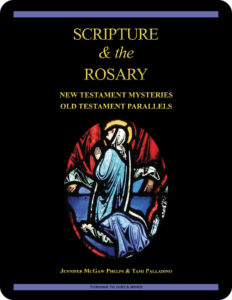 Scripture & the Rosary: New Testament Mysteries, Old Testament Parallels, a 26-lesson Catholic Bible study with an imprimatur, looks at the biblical foundations of the Rosary. The study includes lessons on Pope St. John Paul II’s Rosarium Virginis Mariae (Rosary of the Virgin Mary), the Apostles’ Creed, and the Luminous Mysteries as well as the original 15 Mysteries of the Rosary. Color photographs of stained glass windows depict key scenes in the lives of Jesus and Mary. Free digital lessons rotate throughout the year on our website.
Scripture & the Rosary: New Testament Mysteries, Old Testament Parallels, a 26-lesson Catholic Bible study with an imprimatur, looks at the biblical foundations of the Rosary. The study includes lessons on Pope St. John Paul II’s Rosarium Virginis Mariae (Rosary of the Virgin Mary), the Apostles’ Creed, and the Luminous Mysteries as well as the original 15 Mysteries of the Rosary. Color photographs of stained glass windows depict key scenes in the lives of Jesus and Mary. Free digital lessons rotate throughout the year on our website.
start a Turning to God’s Word Bible study
 Thank you for your interest in You Shall Have No Other Gods: The Book of Exodus.
Thank you for your interest in You Shall Have No Other Gods: The Book of Exodus.  Information about beginning a Turning to God’s Word Bible study can be found at start a Bible study. Tami, Matthew, and I are available to answer your questions and to offer support. You may use this email to contact us directly if you’re interested in starting a Turning to God study or in having your study schedule listed with other TtGW study groups on our website. —Jennifer
Information about beginning a Turning to God’s Word Bible study can be found at start a Bible study. Tami, Matthew, and I are available to answer your questions and to offer support. You may use this email to contact us directly if you’re interested in starting a Turning to God study or in having your study schedule listed with other TtGW study groups on our website. —Jennifer
*There are seven deuterocanonical books in the Old Testament—the Books of Tobit, Judith, Wisdom, Sirach, Baruch, and First and Second Maccabees, as well as some passages in the Books of Esther and Daniel. Protestants usually refer to these works as “apocryphal,” a word that means “outside the (Protestant) canon” because they’re excluded from most Protestant Bibles. The word “deuterocanonical” means “second canon”; Catholics use that word to refer to any section of the Catholic Old Testament for which there are no extant, or existing, Hebrew manuscripts. All of the deuterocanonical books appear in the Septuagint, the earliest remaining versions of which date to the 1st century B.C. This Greek translation of the Old Testament was in common use by Jews at the time of Jesus. Learn more by reading How Do Catholic & Protestant Bibles Differ?
Turning to God’s Word printed Bible studies use the 2006 Revised Standard Version Second Catholic Edition (RSV2CE) translation for all Scripture references except those to the Psalms, which are taken from The Abbey Psalms and Canticles, prepared by the Benedictine monks of Conception Abbey and published in 2020 by the United States Conference of Catholic Bishops (USCCB). All Scripture links for the online study pages for You Shall Have No Other Gods: The Book of Exodus are to the 1966 Revised Standard Version Catholic Edition (RSVCE) translation. The New International Version (NIV) audio recordings follow the same chapter and verse numbering as the RSV Catholic translations, but the NIV translation doesn’t include the deuterocanonical books and passages.
The 1966 RSVCE uses archaic pronouns and verb forms such as “thee,” “thou,” “didst” in the Psalms and in direct quotations attributed to God. The 2006 RSV2CE replaces those with more accessible English. The few significant translation changes in the RSV2CE include rendering almah as “virgin” in the Book of Isaiah 7:14 and restoring the term “begotten” in the Gospel According to John 3:16.
Numbering varies for some passages in this Bible study. Turning to God’s Word studies (print and digital) follow the numbering in the Revised Standard Version Catholic translations (RSV2CE and RSVCE). Discrepancies in the New American Bible Revised Edition (NABRE) are noted in the Index of Scripture Citations in the study book and the online sample.
 You can learn more about the Psalms by viewing a sample lesson from the Turning to God’s Word Catholic Bible study Sing a New Psalm: Communicating with God Through the Prayers of the Church—Volume I: Lauds & Vespers. The second part of that study, Sing a New Psalm: Communicating with God Through the Prayers of the Church—Volume II: Vigils, Day Prayer & Compline, is scheduled for publication in 2025. Some verse numbers may vary in different translations of the Psalms.
You can learn more about the Psalms by viewing a sample lesson from the Turning to God’s Word Catholic Bible study Sing a New Psalm: Communicating with God Through the Prayers of the Church—Volume I: Lauds & Vespers. The second part of that study, Sing a New Psalm: Communicating with God Through the Prayers of the Church—Volume II: Vigils, Day Prayer & Compline, is scheduled for publication in 2025. Some verse numbers may vary in different translations of the Psalms.
